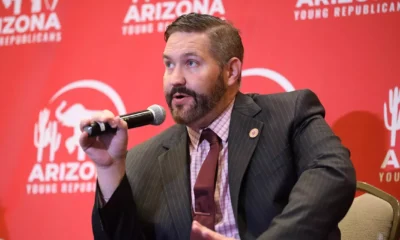Business
Emails Disrupt Prescott Rodeo Lawsuit Tensions

Recent revelations from newly discovered emails could jeopardize a proposed $15.3 million allocation for the Prescott Rodeo. Legal documents submitted in court suggest that the state Treasurer’s Office committed an additional $10 million to the International Dark Sky Discovery Center before soliciting proposals from other potential candidates for the funds.
This development is particularly significant as both funding allocations stem from the same 2023 legislation, which allows lawmakers to earmark portions of the state’s budget surplus for specific projects. While the ongoing lawsuit focuses solely on the rodeo funding, the emails regarding the dark sky initiative indicate that state officials might have attempted to create a façade of legal compliance once the lawsuit was initiated.
Attorneys representing both sides are currently barred from discussing the contents of the sealed documents, following a judge’s order at a hearing held on Monday. However, news sources like Capitol Media Services and the Yellow Sheet Report have managed to obtain the documents. New legal filings from the plaintiffs contend that the discovered emails contradict the state’s assertion of a lawful process concerning the funds being directed to Prescott Frontier Days, an organization that oversees the rodeo.
Should the judge rule in favor of the plaintiffs, the rodeo funding could be terminated, although the funding for the dark sky project has already been disbursed. A ruling against the state could establish significant ramifications for future legislative practices, particularly concerning the allocation of state funds to private entities without appropriate compensation, which may violate Arizona’s Gift Clause.
The controversy traces back to the budget approved by lawmakers in 2023, which was marked by a substantial surplus. Legislators received allocations of approximately $20 million to $30 million each to distribute to various projects. Some of these funds were directed towards road improvements, while others were used for a one-time family tax rebate.
Among these allocations was the $15.3 million intended for a nonprofit that operates the rodeo at Yavapai County fairgrounds. While unspoken intentions suggested these funds were meant for a $40.7 million upgrade plan for the rodeo facilities leased by Prescott Frontier Days, the absence of a formal agreement has raised questions about the legality of the allocation.
In June 2023, the Arizona Center for the Law in the Public Interest filed a lawsuit on behalf of Prescott residents Howard Mechanic and Ralph Hess, the latter a retired judge, claiming the funding violates the Gift Clause due to its lack of support for a public purpose. Arizona courts have previously ruled that merely increasing sales tax revenue does not satisfy the requirements of the Gift Clause.
Concerns have also been raised over the absence of a binding contract that would dictate how the rodeo funding would be utilized. Legal representatives for the plaintiffs emphasize that crucial details regarding the state’s expected return on investment were never specified.
In their defense, state officials have argued that they would follow the legally mandated procedure involving a formal request for information regarding the rodeo funding. However, emails reveal that the Treasurer’s Office had already confirmed funding for the dark sky project, instructing it on procedures to deposit the money. Such findings led challengers to assert that the state’s actions appear to have been purposefully deceptive.
Emails exchanged among state officials reveal contradictory statements regarding the Treasurer’s authority over funds. One email stated, “the treasurer does not have the authority to enforce the use of funds,” conflicting with earlier claims about grant agreements strictly designating fund usage. Challengers argue that these inconsistencies undermine the state’s position.
Notably, some of the emails are subject to attorney-client privilege, complicating their admissibility in court. However, the release of these communications to a third party via a public records request may result in a waiver of that privilege if determined voluntary by the court.


















